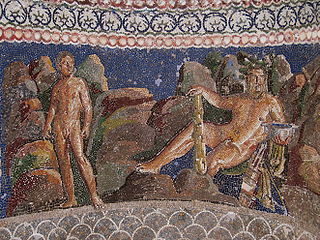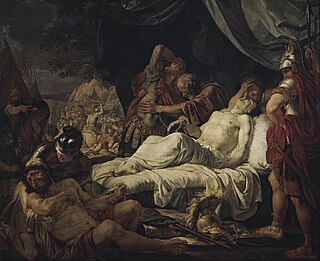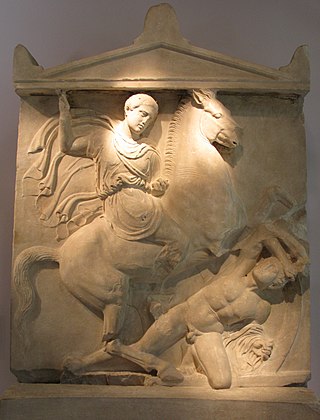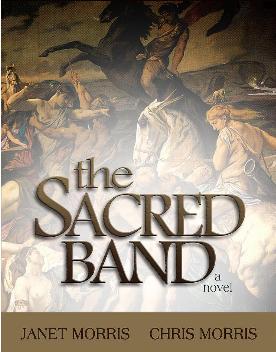
Thebes is a city in Boeotia, Central Greece, and is one of the oldest continuously inhabited cities in the world. It is the largest city in Boeotia and a major center for the area along with Livadeia and Tanagra.

In Greek mythology, Iolaus was a Theban divine hero. He was famed for being Heracles' charioteer and squire, and for helping with some of his Labors, as well as for being one of the Argonauts.

Epaminondas was a Greek general and statesman of the 4th century BC who transformed the Ancient Greek city-state of Thebes, leading it out of Spartan subjugation into a pre-eminent position in Greek politics called the Theban Hegemony. In the process, he broke Spartan military power with his victory at Leuctra and liberated the Messenian helots, a group of Peloponnesian Greeks who had been enslaved under Spartan rule for some 230 years following their defeat in the Third Messenian War ending in 600 BC. Epaminondas reshaped the political map of Greece, fragmented old alliances, created new ones, and supervised the construction of entire cities. He was also militarily influential and invented and implemented several important battlefield tactics.

Pelopidas was an important Theban statesman and general in Greece, instrumental in establishing the mid-fourth century Theban hegemony.

The Battle of Leuctra was a battle fought on 6 July 371 BC between the Boeotians led by the Thebans, and the Spartans along with their allies amidst the post–Corinthian War conflict. The battle took place in the vicinity of Leuctra, a village in Boeotia in the territory of Thespiae. The Theban victory shattered Sparta's immense influence over the Greek peninsula, which Sparta had gained with its victory in the Peloponnesian War a generation earlier.
The Sacred Band of Thebes was a troop of select soldiers. According to some ancient Greek claims, 150 pairs of male lovers formed the elite force of the Theban army in the 4th century BC, ending Spartan domination. Its predominance began with its crucial role in the Battle of Leuctra in 371 BC. It was annihilated by Philip II of Macedon in the Battle of Chaeronea in 338 BC.

The Corinthian War was a conflict in ancient Greece which pitted Sparta against a coalition of city-states comprising Thebes, Athens, Corinth and Argos, backed by the Achaemenid Empire. The war was caused by dissatisfaction with Spartan imperialism in the aftermath of the Peloponnesian War, both from Athens, the defeated side in that conflict, and from Sparta's former allies, Corinth and Thebes, who had not been properly rewarded. Taking advantage of the fact that the Spartan king Agesilaus II was away campaigning in Asia against the Achaemenid Empire, Thebes, Athens, Corinth and Argos forged an alliance in 395 BC with the goal of ending Spartan hegemony over Greece; the allies' war council was located in Corinth, which gave its name to the war. By the end of the conflict, the allies had failed to end Spartan hegemony over Greece, although Sparta was durably weakened by the war.

The (second) Battle of Mantinea or Mantineia was fought on 4 July 362 B.C. between the Thebans, led by Epaminondas and supported by the Arcadians and the Boeotian league against the Spartans, led by King Agesilaus II and supported by the Eleans, Athenians, and Mantineans. The battle was to determine which of the two alliances would dominate Greece. However, the death of Epaminondas and his intended successors would cost Thebes the military leadership and initiative to maintain Theban supremacy in the region. Similarly, the Spartans were weakened by yet another defeat and loss of troops. Epaminondas' death coupled with the impact on the Spartans of yet another defeat weakened both alliances, and paved the way for Macedonian conquest led by Philip II of Macedon.

Thespiae was an ancient Greek city (polis) in Boeotia. It stood on level ground commanded by the low range of hills which run eastward from the foot of Mount Helicon to Thebes, near modern Thespies.

In ancient Greece, an eromenos was the younger and passive partner in a male homosexual relationship. The partner of an eromenos was the erastes, the older and active partner. The eromenos was often depicted as beautiful, beardless and more youthful-looking than the erastes.

In classical antiquity, writers such as Herodotus, Plato, Xenophon, Athenaeus and many others explored aspects of homosexuality in Greek society. The most widespread and socially significant form of same-sex sexual relations in ancient Greece amongst elite circles was between adult men and pubescent or adolescent boys, known as pederasty. Certain city-states allowed it while others were ambiguous or prohibited it. Though sexual relationships between adult men did exist, it is possible at least one member of each of these relationships flouted social conventions by assuming a passive sexual role according to Kenneth Dover, though this has been questioned by recent scholars. It is unclear how such relations between same-sex partners were regarded in the general society, especially for women, but examples do exist as far back as the time of Sappho.

Pederasty in ancient Greece was a socially acknowledged romantic relationship between an older male and a younger male usually in his teens. It was characteristic of the Archaic and Classical periods. The influence of pederasty on Greek culture of these periods was so prevalent that it has been called "the principal cultural model for free relationships between citizens."
Greek love is a term originally used by classicists to describe the primarily homoerotic customs, practices, and attitudes of the ancient Greeks. It was frequently used as a euphemism for both homosexuality and pederasty. The phrase is a product of the enormous impact of the reception of classical Greek culture on historical attitudes toward sexuality, and its influence on art and various intellectual movements.
'Greece' as the historical memory of a treasured past was romanticised and idealised as a time and a culture when love between males was not only tolerated but actually encouraged, and expressed as the high ideal of same-sex camaraderie. ... If tolerance and approval of male homosexuality had happened once—and in a culture so much admired and imitated by the eighteenth and nineteenth centuries—might it not be possible to replicate in modernity the antique homeland of the non-heteronormative?

The relationship between Achilles and Patroclus is a key element of the stories associated with the Trojan War. In the Iliad, Homer describes a deep and meaningful relationship between Achilles and Patroclus, where Achilles is tender toward Patroclus, but callous and arrogant toward others. Its exact nature—whether homosexual, a non-sexual deep friendship, or something else entirely—has been a subject of dispute in both the Classical period and modern times. Homer never explicitly casts the two as lovers, but they were depicted as lovers in the archaic and classical periods of Greek literature, particularly in the works of Aeschylus, Aeschines and Plato.

The Last of the Wine is Mary Renault's first novel set in ancient Greece, the setting that would become her most important arena. The novel was published in 1956 and is the second of her works to feature male homosexuality as a major theme. It was a bestseller within the gay community. The book is a portrait of Athens at the close of the Golden Age and the end of the Peloponnesian War with Sparta, and includes Socrates as a character.

Classical Greece was a period of around 200 years in Ancient Greece, marked by much of the eastern Aegean and northern regions of Greek culture gaining increased autonomy from the Persian Empire; the peak flourishing of democratic Athens; the First and Second Peloponnesian Wars; the Spartan and then Theban hegemonies; and the expansion of Macedonia under Philip II. Much of the early defining politics, artistic thought, scientific thought, theatre, literature and philosophy of Western civilization derives from this period of Greek history, which had a powerful influence on the later Roman Empire. Part of the broader era of classical antiquity, the classical Greek era ended after Philip II's unification of most of the Greek world against the common enemy of the Persian Empire, which was conquered within 13 years during the wars of Alexander the Great, Philip's son.

Pederasty or paederasty is a sexual relationship between an adult man and a boy. It was a socially acknowledged practice in Ancient Greece and Rome and elsewhere in the world, such as Pre-Meiji Japan.

The Sacred Band of Stepsons is a fictional ancient cavalry unit created by Janet Morris and based on the historical Sacred Band of Thebes, an elite strike force of paired lovers and friends that flourished during the fourth century BC in ancient Greece. The Sacred Band of Stepsons series of fantasy novels and stories take place in a myth-like milieu that mixes historical places such as Nisibis, Mygdonia and Chaeronea; warriors such as Theagenes ; gods such as Enlil, Maat and Harmonia; philosophers such as Heraclitus and Thales; cavalry tactics and customs such as homosexuality in the militaries of ancient Greece with those that exist only in fantasy. The exploits of the Stepsons are chronicled in eleven short stories and nine novels. In a fantasy context, this series explores the difficulties facing war-fighters in personal relationships and the enduring questions surrounding the military's historical mixing of homosexuals and heterosexuals in combat.

The Theban–Spartan War of 378–362 BC was a series of military conflicts fought between Sparta and Thebes for hegemony over Greece. Sparta had emerged victorious from the Peloponnesian War against Athens, and occupied an hegemonic position over Greece. However, the Spartans' violent interventionism upset their former allies, especially Thebes and Corinth. The resulting Corinthian War ended with a difficult Spartan victory, but the Boeotian League headed by Thebes was also disbanded.
Cleomachus was an Ancient Greek warrior from Thessaly, notable for his defeat of the Eretrians in the Lelantine War.
















